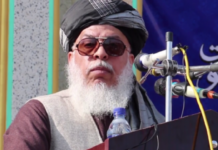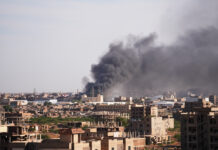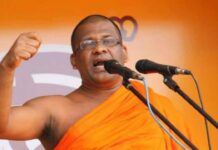India’s Supreme Court has controversially awarded Hindus control of a site in the town of Ayodhya where Hindu mobs destroyed a historic mosque in 1992.
Muslims will be given five acres of land at an alternative site in Ayodhya, in northern Uttar Pradesh state, the court ruled.
In a unanimous decision over the site claimed by both Hindus and Muslims, the five-judge bench asked the government to set up a trust that will construct a temple for Hindu deity Ram.
Prime Minister Narendra Modi hailed the verdict, saying it had “amicably” ended the decades-old dispute.
“The halls of justice have amicably concluded a matter going on for decades. Every side, every point of view was given adequate time and opportunity to express differing points of view. This verdict will further increase people’s faith in judicial processes,” Modi tweeted.
Hardliners among India’s majority Hindus, including supporters of Modi’s Hindu-nationalist Bharatiya Janata Party (BJP), believe that Lord Ram was born at the site where the Babri Mosque existed. They say that the first Mughal emperor Babur built Babri Mosque on top of a temple at the site.
After Saturday’s verdict, Modi called for calm and police went on alert, with thousands of extra personnel deployed and schools closed in and around Ayodhya and elsewhere. In some towns, internet services were also suspended to stop the spread of rumours.
Subscribe to our newsletter and stay updated on the latest news and updates from around the Muslim world!
Muslim organisations have appealed for calm to prevent communal flare-ups.
The BJP has campaigned for years for a temple to be built at Ayodhya, and a verdict clearing the way for that is a major victory for the 69-year-old Modi, just months into his second term.
Muslims said they prayed at the mosque for generations until 1949, when Hindu activists placed idols of Ram.
The 460-year-old mosque was demolished in 1992 by Hindu mobs triggering nationwide religious violence that left about 2,000 people dead, most of them Muslims.
Muslims in the town have expressed disappointment at the verdict.
“The court has not specified where it would give the land for the mosque. If the court would have specified it, Muslims would have been pleased,” said Mohammed Shibu Khan told AlJazeera. “However, I am happy that this has come to an end as the people of Ayodhya are tired of frequent shutdowns throughout the year.”
In the Muslim-majority area of Jamia Nagar in the capital New Delhi, people said they did not get justice.
“[That] the Hindu mob which demolished Babri Masjid went unpunished only proves India’s incompetence as a democracy,” Nabiya Khan, a student, told Al Jazeera. “December 6, 1992 and November 9, 2019, will be remembered as days of death of secularism in India.”






















